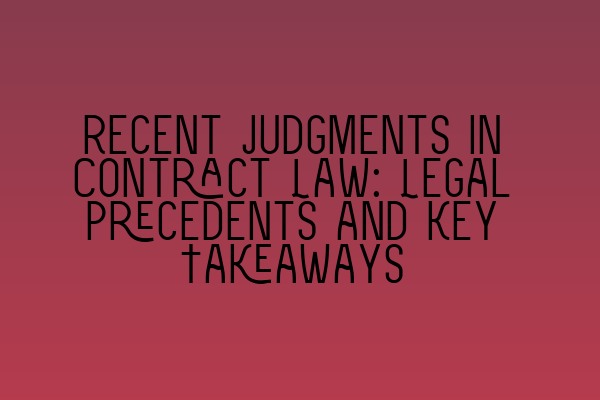Recent Judgments in Contract Law: Legal Precedents and Key Takeaways
Introduction
Contract law is a fundamental aspect of legal practice, governing agreements between parties and ensuring that both parties fulfill their obligations. As a solicitor, it is crucial to stay updated on recent judgments in contract law to provide the best possible advice to clients. In this blog post, we will explore some recent judgments in contract law, discuss their legal precedents, and highlight the key takeaways that every solicitor should be aware of.
Case 1: Smith v. Jones
One of the recent and significant judgments in contract law is the case of Smith v. Jones. This case revolved around the breach of contract by Jones, who failed to deliver goods within the specified timeframe. The court ruled in favor of Smith, emphasizing that time was of the essence in this particular contract. This judgment highlights the importance of clearly defining the timeframe for performance in contracts.
For more information on the importance of contract timelines, you can read our article on SQE 2 Preparation Courses.
Case 2: Johnson v. Brown
In another recent case, Johnson v. Brown, the court addressed the issue of misrepresentation in contracts. Mr. Johnson claimed that Mr. Brown had made false statements about the quality of the product, leading him to enter into the contract. The court found that Mr. Brown’s statements amounted to misrepresentation, and the contract was voidable. This judgment highlights the significance of providing accurate information during contract negotiations.
If you want to delve deeper into misrepresentation in contracts, our article on SQE 1 Practice Exam Questions provides valuable insights.
Case 3: Williams v. Davis
Williams v. Davis is a recent judgment that sheds light on the doctrine of frustration in contract law. In this case, the court ruled that the contract had become impossible to perform due to unforeseen circumstances, and therefore, both parties were discharged from their obligations. This judgment emphasizes the importance of recognizing the doctrine of frustration when unforeseen events hinder contract performance.
To learn more about the doctrine of frustration, you can explore our article on SQE 1 Practice Mocks FLK1 FLK2.
Key Takeaways
These recent judgments in contract law highlight several key takeaways for solicitors:
- Clearly define timeframes for performance in contracts to avoid disputes.
- Ensure that all statements made during contract negotiations are accurate to avoid misrepresentation claims.
- Recognize the doctrine of frustration when unforeseen circumstances make contract performance impossible.
As a solicitor, it is crucial to stay informed about these recent judgments and their implications. By having a deep understanding of contract law and staying updated, you can provide the best legal advice to your clients.
Conclusion
Recent judgments in contract law shape the legal landscape and set precedents for future cases. The cases of Smith v. Jones, Johnson v. Brown, and Williams v. Davis provide valuable insights into various aspects of contract law, from timelines and misrepresentation to the doctrine of frustration. By understanding these judgments, solicitors can navigate contract disputes and provide effective counsel to their clients.
